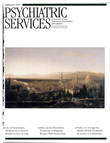Lack of insight among outpatients with schizophrenia
Abstract
OBJECTIVE: This study investigated the prevalence of lack of insight among outpatients with schizophrenia and the relationship between lack of insight and other variables, including whether patients received professional residential supervision. METHODS: A total of 87 stable outpatients with schizophrenia were drawn from community programs in a public-private mental health system. Subjects' clinical symptoms and insight about their illness were assessed using the Positive and Negative Syndrome Scale, a battery of neuropsychological tests, and the Social Functioning Scale. RESULTS: The illness insight of 43 subjects, or 49.5 percent, was at least moderately impaired. Twenty-one subjects, or 25 percent, had severe insight deficits. In a multiple regression analysis, 40 percent of the variance in lack of insight was predicted by ratings of the severity of delusions, difficulty with abstract thinking, lack of social activities, and absence of anxiety. Patients who received professional residential supervision had more impaired insight than those living independently or with family. CONCLUSIONS: Insight deficits are common among stable outpatients engaged in community-based care. These deficits have implications for patients' use of limited services such as residential supervision.



